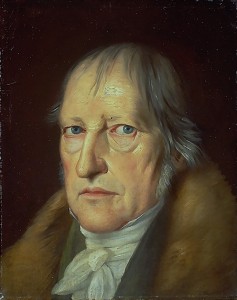 The Freedom of Hegel‘s Concept
The Freedom of Hegel‘s Concept
How is the ?I think as Hegel‘s concept the ground of practical movement? This question is central to Hegelian thought and shows his indebtedness to certain Kantian concepts of freedom. My discussion will focus on the introduction to Book three of Hegel‘s Science of Logic, titled ?The Concept in General. I will first introduce my discussion with a brief analysis of Hegel‘s movement from substance to the concept.
Second, I will approach the question: why is the concept the reflection of the ?I? In order to do this, I will analyze the relation of freedom within the concept itself.
Third, I will ask, how the pure ?I think can claim not to be strictly theoretical. This final exploration will delineate the meanings that the resolution of the universal and particular into their singular can have.
Author: Elise Frketich (MPhil)
The Opening Movement of Hegel‘s Science of Logic: from ‘Being‘ to ‘a Being‘
My paper will examine the opening moves of Hegel’s Science of Logic: from being to nothing, then to becoming and on to determinate being. I shall first explain how the progression is intended to work, an account which I will go on to critique. The transition from being to nothing is incorrectly thematized by Hegel, I shall argue. Further, this thematization, or metalogic,‘ is needed for the passage from becoming to determinate being.
I will show that this critique is immanent, adhering to Hegel’s own methodological principles (above all, presuppositionlessness), and is thus neither transcendent – with the imposition of external materials onto the progression of logic – nor transcendental – where the conditions of possibility of the logical enterprise are called into question.
To support my reading, I will look at Hegel’s use of the philosophies of Parmenides and Heraclitus, as well as his alternative rendering of the being-nothing-becoming movement in the Encyclopedia of Philosophical Sciences. I will conclude with a possible Hegelian line of defense: a reading of the Logic where it is claimed that the logical science progresses as a result of a failure at each stage (for example, Pippin reads the opening of the Logic – where the concepts are very abstract or empty – as a failed attempt to think objects, and progression arises as these concepts determine themselves as richer and more concrete).
Author: Andrew Morris (MA)
The Inter-Subjectivity of Mutual Recognition and the I-Thou: a Comparative Analysis of Hegel
Hegel and Buber are very different thinkers yet both acknowledge that human beings must relate to one another intersubjectively. Hegel presents mutual recognition as an account of intersubjectivity. Buber‘s account of intersubjectivity in his book “I and Thou” involves a dialogical encounter between I‘ and Thou‘. This essay explores the relation of these two views. It is argued that Buber‘s presentation of intersubjectivity shares much in common with Hegel‘s. It is further argued that both of these theories involve converging conceptions of incomplete and asymmetrical intersubjectivity.
Author: Stephen Hudson (MPhil)
Hegel on Phrenology
In the course of his Phenomenology, Hegel offers a critique of his contemporary science, phrenology. This paper aims to demonstrate the significance of Hegel’s critique of the methodology and object of phrenology, in particular, with respect to the understanding of human agency and freedom. It addresses in turn the nature of the claims of phrenology, secondly, Hegel‘ s engagement with phrenology, and finally develops the consequences of these in terms of the possibility of parallels with contemporary science and social phenomena.
The paper will be accordingly divided into three sections. First we shall give an account of the structure of phrenology. In the second section of the paper, we shall see precisely why Hegel takes issue with this science. We will follow Hegel in suggesting that the freedom of the individual may not be determined by osseous forms. We shall see that Hegel‘ s account gives us the resources to understand subjects as more than fixed realities – as living, dynamic entities, formed and revealed through action.
The final section of the paper will attempt to draw out some of the most important consequences of Hegel‘ s engagement with phrenology with respect to two fields – the relevance to contemporary science and to certain other historically situated socio-political uses of the logic of phrenology. We will thus explore whether, as McIntyre has argued, we may uncover here a principle in Hegel’s polemic, which still holds fast and reveals something important to us about how we think of the freedom of the human agent.
Author: Lydia Azadpour (MPhil)
